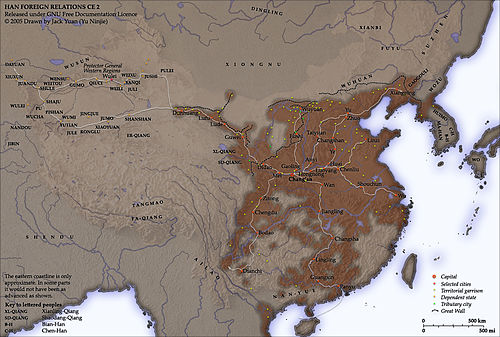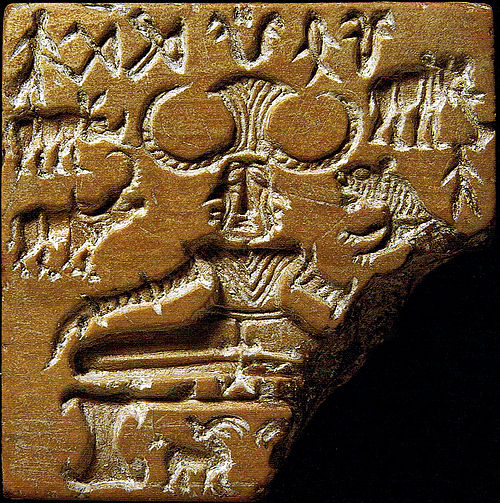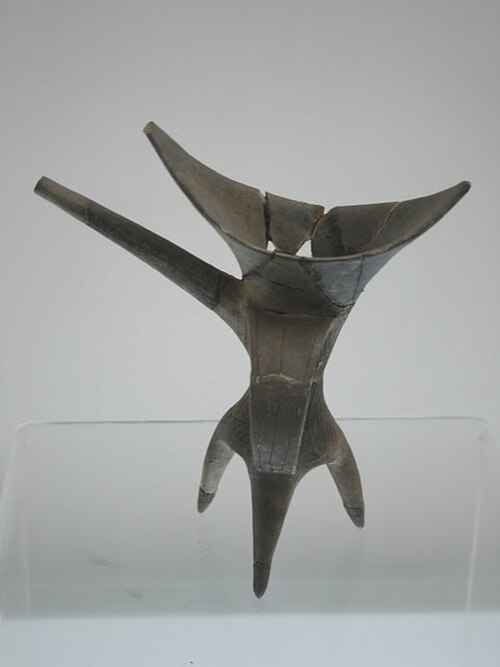Ancientadjective
Having lasted from a remote period; having been of long duration; of great age, very old.
Ancientadjective
Existent or occurring in time long past, usually in remote ages; belonging to or associated with antiquity; old, as opposed to modern.
Ancientadjective
(history) Relating to antiquity as a primarily European historical period; the time before the Middle Ages.
Ancientadjective
(obsolete) Experienced; versed.
Ancientadjective
(obsolete) Former; sometime.
Ancientnoun
A person who is very old.
Ancientnoun
A person who lived in ancient times.
Ancientnoun
A flag, banner, standard or ensign.
Ancientnoun
One of the senior members of the Inns of Court or of Chancery.
Ancientnoun
(obsolete) A senior; an elder; a predecessor.
Ancientadjective
Old; that happened or existed in former times, usually at a great distance of time; belonging to times long past; specifically applied to the times before the fall of the Roman empire; - opposed to modern; as, ancient authors, literature, history; ancient days.
Ancientadjective
Old; that has been of long duration; of long standing; of great age; as, an ancient forest; an ancient castle.
Ancientadjective
Known for a long time, or from early times; - opposed to recent or new; as, the ancient continent.
Ancientadjective
Dignified, like an aged man; magisterial; venerable.
Ancientadjective
Experienced; versed.
Ancientadjective
Former; sometime.
Ancientnoun
Those who lived in former ages, as opposed to the moderns.
Ancientnoun
An aged man; a patriarch. Hence: A governor; a ruler; a person of influence.
Ancientnoun
A senior; an elder; a predecessor.
Ancientnoun
One of the senior members of the Inns of Court or of Chancery.
Ancientnoun
An ensign or flag.
Ancientnoun
The bearer of a flag; an ensign.
Ancientadjective
belonging to times long past especially of the historical period before the fall of the Western Roman Empire;
Ancientadjective
very old;
Ancientadjective
belonging to the very distant past and no longer in existence
Ancientadjective
having been in existence for a very long time
Ancientadjective
showing or feeling signs of age or wear
Ancientnoun
an old man
Ancientnoun
a standard, flag, or ensign.
Oldadjective
Of an object, concept, relationship, etc., having existed for a relatively long period of time.
Oldadjective
Of a living being, having lived for most of the expected years.
Oldadjective
Of a perishable item, having existed for most, or more than its shelf life.
Oldadjective
Of an item that has been used and so is not new unused.
Oldadjective
Having existed or lived for the specified time.
Oldadjective
(heading) Of an earlier time.
Oldadjective
Former, previous.
Oldadjective
That is no longer in existence.
Oldadjective
Obsolete; out-of-date.
Oldadjective
Familiar.
Oldadjective
Tiresome.
Oldadjective
Said of subdued colors, particularly reds, pinks and oranges, as if they had faded over time.
Oldadjective
A grammatical intensifier, often used in describing something positive. (Mostly in idioms like good old, big old and little old, any old and some old.)
Oldadjective
(obsolete) Excessive, abundant.
Oldnoun
(with "the") People who are old; old beings; the older generation, taken as a group.
Oldnoun
Open country.
Oldadjective
Not young; advanced far in years or life; having lived till toward the end of the ordinary term of living; as, an old man; an old age; an old horse; an old tree.
Oldadjective
Not new or fresh; not recently made or produced; having existed for a long time; as, old wine; an old friendship.
Oldadjective
Formerly existing; ancient; not modern; preceding; original; as, an old law; an old custom; an old promise.
Oldadjective
Continued in life; advanced in the course of existence; having (a certain) length of existence; - designating the age of a person or thing; as, an infant a few hours old; a cathedral centuries old.
Oldadjective
Long practiced; hence, skilled; experienced; cunning; as, an old offender; old in vice.
Oldadjective
Long cultivated; as, an old farm; old land, as opposed to new land, that is, to land lately cleared.
Oldadjective
Worn out; weakened or exhausted by use; past usefulness; as, old shoes; old clothes.
Oldadjective
More than enough; abundant.
Oldadjective
Aged; antiquated; hence, wanting in the mental vigor or other qualities belonging to youth; - used disparagingly as a term of reproach.
Oldadjective
Old-fashioned; wonted; customary; as of old; as, the good old times; hence, colloquially, gay; jolly.
Oldadjective
Used colloquially as a term of cordiality and familiarity.
Oldnoun
past times (especially in the phrase `in days of old')
Oldadjective
(used especially of persons) having lived for a relatively long time or attained a specific age; especially not young; often used as a combining form to indicate an age as specified as in `a week-old baby';
Oldadjective
of long duration; not new;
Oldadjective
of an earlier time;
Oldadjective
(used for emphasis) very familiar;
Oldadjective
lacking originality or spontaneity; no longer new;
Oldadjective
just preceding something else in time or order;
Oldadjective
of a very early stage in development;
Oldadjective
old in experience;
Oldadjective
used informally especially for emphasis;
Oldadjective
having lived for a long time; no longer young
Oldadjective
made or built long ago
Oldadjective
possessed or used for a long time
Oldadjective
boring or tiresome, especially as a result of repetition or overfamiliarity
Oldadjective
having the characteristics or showing the signs of age
Oldadjective
belonging to the past; former
Oldadjective
used to refer to a thing which has been replaced by something similar
Oldadjective
dating from far back; long-established or known
Oldadjective
denoting someone who formerly attended a specified school
Oldadjective
(of a form of a language) as used in former or earliest times.
Oldadjective
of a specified age
Oldadjective
a person or animal of the age specified
Oldadjective
used to express affection, familiarity, or contempt




















